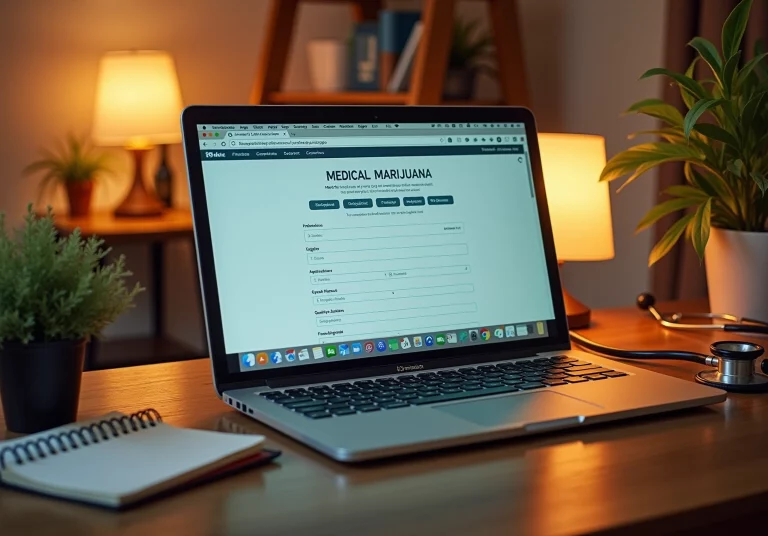Answering Frequently Asked Questions About Medical Marijuana Cards
by Haley Mills · June 10, 2024
Looking for answers about medical marijuana cards? Find out everything you need to know in this comprehensive guide. Don’t miss out, click now!

Are you curious about medical marijuana cards and how they work? Do you have questions about whether you qualify for one or how to apply? Look no further!
In this article, we will be answering frequently asked questions about medical marijuana cards in a way that serves you. We understand that you may have concerns or doubts, but don’t worry – we’re here to help you navigate through all the information and provide you with the answers you need.
So, what exactly is a medical marijuana card? Well, it’s a card that allows you to purchase and use marijuana for medicinal purposes legally. It’s like a golden ticket that grants you access to the healing properties of this plant.
But how do you qualify for one? That’s a great question! In order to qualify for a medical marijuana card, you typically need to have a qualifying medical condition. Don’t worry, though – we’ll be diving deeper into the qualifying conditions and the application process later in this article.
What is a Medical Marijuana Card?
A medical marijuana card is like your golden ticket to the land of legal weed. It’s a document issued by a state-approved program that allows you to purchase and use marijuana for medical purposes legally. Think of it as your official permission slip to indulge in the herb’s healing powers.
Now, you might be wondering how you can get your hands on this magical card. Well, first things first, you need to have a qualifying medical condition.
This can range from chronic pain to anxiety to cancer. Basically, if you have a condition that the use of marijuana can alleviate, you’re in luck. Next, you’ll need to find a licensed doctor who can evaluate your condition and determine if medical marijuana is a suitable treatment option for you.
Once you’ve got the doctor’s approval, you’ll need to fill out some paperwork, pay a fee, and voila! Your very own medical marijuana card will be on its way to you. Having a medical marijuana card not only gives you access to a wide variety of strains and products, but it also offers you the peace of mind of knowing that you’re using marijuana legally and responsibly.
How Do I Qualify for a Medical Marijuana Card?
To qualify for a medical marijuana card, you must meet certain criteria and provide supporting documentation. Here’s what you need to do:
- First, you’ll need to have a qualifying medical condition. These conditions can vary depending on the state you’re in, but common qualifying conditions include chronic pain, cancer, epilepsy, and multiple sclerosis. Check your state’s specific list of qualifying conditions to see if you’re eligible.
- Next, you’ll need to consult with a qualified healthcare provider. They will evaluate your medical history and determine if medical marijuana is a suitable treatment option for your condition. It’s important to be open and honest with your healthcare provider about your symptoms and any previous treatments you’ve tried.
- Once you’ve obtained a recommendation from your healthcare provider, you’ll need to gather the necessary supporting documentation. This typically includes medical records, prescriptions, and other relevant documentation proving your medical condition.
- After you have all your documentation, you’ll need to fill out an application for a medical marijuana card. This application will require personal information, such as your name, address, and contact information. You may also need to provide a passport-sized photo and pay a fee, which varies depending on the state.
- Finally, you’ll need to submit your application and supporting documentation to the appropriate state agency. They will review your application and, if approved, issue you a medical marijuana card.
How Do I Apply for a Medical Marijuana Card?
Applying for a medical marijuana card is a straightforward process that involves completing an application and providing the necessary documentation. To start, you’ll need to find out if medical marijuana is legal in your state and if you qualify for a card. Once you’ve determined your eligibility, you can begin the application process. The specific requirements may vary depending on your state, but generally, you’ll need to provide proof of residency, a valid form of identification, and medical records that demonstrate your qualifying condition.
To make the application process even easier, I’ve created a handy table below that outlines the general steps you’ll need to take:
| Step | Description |
|---|---|
| 1 | Research the laws and regulations regarding medical marijuana in your state |
| 2 | Determine if you meet the qualifying conditions for a medical marijuana card |
| 3 | Gather the necessary documentation, such as proof of residency and medical records |
| 4 | Complete the application form with accurate and up-to-date information |
| 5 | Submit the application and pay any required fees |
| 6 | Wait for approval from the state’s medical marijuana program |
| 7 | Once approved, receive your medical marijuana card and begin accessing dispensaries |
What Conditions Can Be Treated with Medical Marijuana?
You can use medical marijuana to treat a variety of conditions. Medical marijuana has been found to be effective in alleviating symptoms of chronic pain, including pain caused by conditions such as arthritis, fibromyalgia, and multiple sclerosis. It can also be used to manage symptoms of nausea and vomiting associated with chemotherapy or other medical treatments.
Additionally, medical marijuana has shown promise in treating conditions such as epilepsy, PTSD, and Crohn’s disease. It can help reduce seizures in individuals with epilepsy and provide relief from anxiety and depression in those with PTSD. For individuals with Crohn’s disease, medical marijuana can help reduce inflammation in the digestive tract and alleviate symptoms such as abdominal pain and diarrhea.
Overall, medical marijuana offers a natural and holistic approach to treating a wide range of conditions, providing relief and improving the quality of life for many individuals.
In addition to these conditions, medical marijuana can also be used to manage symptoms of glaucoma, a condition that causes increased pressure in the eye and can lead to vision loss. Medical marijuana has been found to reduce intraocular pressure and provide relief to individuals with glaucoma.
Furthermore, it can be used to alleviate symptoms of insomnia and improve sleep quality. Medical marijuana has a calming effect and can help individuals relax and fall asleep more easily. It can also be beneficial for individuals with appetite loss, as it can stimulate the appetite and help individuals maintain a healthy weight.
What Are the Benefits and Risks of Using Medical Marijuana?
One potential concern may be the potential risks associated with using medical marijuana, but it’s essential to consider the numerous benefits it can provide. While it’s true that there are some risks involved, such as the potential for dependence or addiction, it’s important to remember that these risks are relatively low compared to other medications.
In fact, many people find that medical marijuana can provide significant relief from their symptoms and improve their overall quality of life. Here are three key benefits of using medical marijuana:
- Pain relief: Medical marijuana has been shown to be effective in reducing chronic pain, particularly in conditions such as arthritis, fibromyalgia, and multiple sclerosis. By targeting the endocannabinoid system in the body, medical marijuana can help to alleviate pain and inflammation, allowing individuals to function more comfortably on a daily basis.
- Improved appetite and nausea relief: One of the well-known benefits of medical marijuana is its ability to stimulate appetite and reduce nausea. This can be particularly helpful for individuals undergoing chemotherapy or those with conditions that cause appetite loss and nausea, such as HIV/AIDS or certain gastrointestinal disorders.
- Reduced anxiety and improved mental health: Medical marijuana has been found to have calming and relaxing effects on the mind, making it a potential treatment option for individuals with anxiety disorders or PTSD. It can also help to improve sleep and reduce symptoms of depression, providing a more balanced and positive mental state.
Frequently Asked Questions
Are there any age restrictions for obtaining a medical marijuana card?
You must be at least 18 years old to obtain a medical marijuana card. This age restriction ensures that the use of medical marijuana is limited to individuals who are mature enough to make informed decisions about their health.
Can I use my medical marijuana card in other states?
Sure, you can use your medical marijuana card in other states… if you enjoy the thrill of breaking the law! Unfortunately, marijuana laws vary from state to state, so packing your bags won’t solve your cravings.
How long is a medical marijuana card valid for?
Your medical marijuana card is typically valid for one year. However, some states may have different expiration dates. Remember to renew it before it expires to continue accessing the benefits of medical marijuana.
Can I grow my own marijuana if I have a medical marijuana card?
Yes, you can grow your own marijuana if you have a medical marijuana card. It allows you to cultivate a limited number of plants for personal use, providing you with a more convenient and cost-effective option.
Will having a medical marijuana card affect my ability to own a firearm?
Having a medical marijuana card may impact your ability to own a firearm. Federal law prohibits firearm possession for individuals using marijuana, even for medical purposes. Consider the legal implications before making any decisions.
Last Updated: September 23, 2025
Get Approved for Your Medical Marijuana Card in Minutes!

Get Your Medical Card
Connect with a licensed physician online in minutes

Like This Article?
Share with your friends
Table of Contents
Keep Reading
-
The Comprehensive Guide To Veganic Weed
Learn how to grow your own veganic weed – organic and cruelty-free! Discover the ultimate guide to sustainable marijuana cultivation that’s good for you and the planet. Start growing today!
-
Can You Bring THC Gummies On An Airplane?
Discover the truth about taking THC gummies on a plane. Don’t risk missing out – click here to find out if you can bring them with you and plan your cannabis-friendly travel now!
-
4 Steps on How to Get Medical Marijuanas Card MO
Learn how to get a medical marijuana card in Missouri with our step-by-step guide.



